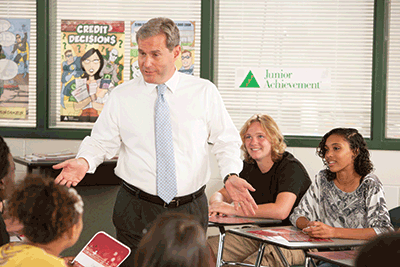To graduate from high school, students in Washington have to pass tests showing their proficiency at math, writing and reading. But when it comes to balancing a check book, handling a credit card wisely and interacting in the world of business, there’s an even harsher exam, with just one question at its core: do they sink or do they swim? The answer may affect today’s students for the rest of their lives, but don’t expect to see financial literacy on the list of graduation requirements any time soon.
Across Southwest Washington, however, dozens of teachers are trying to help children and teens learn to manage a budget, borrow wisely and make responsible financial choices when they grow up. Increasingly, they’re turning to a 94-year-old nonprofit founded to help young people navigate the free-market economy: Junior Achievement.
Junior Achievement (JA) sends volunteers into local classrooms to teach age-appropriate financial literacy and workplace skills, beginning at kindergarten and continuing through 12th grade. The program reaches about 9.2 million students worldwide each year, roughly 10,000 in Southwest Washington.
“All of our curriculum is hands on, fun for the kids,” said Kari Baxter, Junior Achievement’s Vancouver and Southwest Washington district director. “They have a great time learning while getting to interact with their classmates and getting taught by somebody within the community.”
In the JA Our Community program, for example, grade-school students explore how people in different jobs come together to form an interdependent community. Through roleplaying and team work, they explore ideas around work, taxes and problem solving.
“Banking and business are big concepts within that program,” said Scott Monroe, executive director of elementary education at Evergreen Public Schools. “There’s a lot involved in terms of decision making, identifying choices, and there is financial literacy all throughout.”
Vancouver Public Schools have long had deep grade-school level engagement with JA. Now more and more Evergreen teachers are also welcoming the program into their classes.
JA has worked hard to align its programs with Washington’s curriculum standards, making it a good fit for teachers, Monroe said.
“In Evergreen, it’s not an official part of our curriculum,” he said. “We don’t mandate that every teacher have these folks in there. What we do is make sure our teachers are aware of it, and then if teachers that would like to include it in their classroom curriculum we allow that.”
Bob van Schijndel, a project manager at Hewlett-Packard in Vancouver, said he’s been volunteering to teach JA programs in local schools for 15 years, largely in middle school classrooms. Over the years, he has taught children about the global marketplace and about economic choices key to financial success.
“It’s fun coming into the classroom, talking to the kids, hoping something rubs off on them, whether it’s learning about the global economy, or helping them realize they can do more than they thought they could do,” van Schijndel said.
JA programs also offer children opportunities to develop financial literacy and money management skills outside the classroom. The nonprofit has long offered BizTown summer camps for students ages 10-14. Over the course of a week, participants in the $279 program role-play developing a business and running a business, and explore financial literacy concepts involving savings and checking accounts and budgeting.
A new program, JA Finance Park, more closely aligns with what’s happening in the classroom, said John Hancock, president of Junior Achievement for Oregon and Southwest Washington.
After students complete a classroom curriculum, the program “culminates with a one-day visit to a physical place, JA Finance Park, where kids are assigned a fictional adult role,” Hancock said. Each participant is told his or her assigned age, job, marital status and number of children. “Based on that, they interact with businesses that represent typical expense lines on a household budget – mortgage, car, electricity bill, philanthropy, down to how many times a month we can go out to dinner.
Frontier Middle School students will visit the three-dimensional mini-world of JA Finance on June 3. It has been set up in a building at Janzen Beach in Portland.
“On the surface, this looks like a really cool, exciting, budgeting exercise,” Hancock said. “But on a value level, it exposes kids to the idea that they have to live within their means. We make them struggle with the difficult decisions around balancing all these things.”
Junior Achievement has also developed an online component to its financial education programs, with The Money Jar podcast. Episodes are hosted by Todd Yuzuriha, retired vice president of engineering for Logitech in Vancouver, along with Evan Wilson, a senior research analyst and principal at Pacific Crest in Portland. Installments are free online at www.pagatim.fm/the-money-jar.
“Most of our programs happen in schools or on-site,” Hancock said. “The goal with The Money Jar was to complement those programs. It’s geared toward kids and parents, who can peruse topics to see the values they are bringing to these issues.”
Values are at the core of efforts to educate young people about the financial world, Hancock said. If young people understand the free-market economy and the skills they need to navigate it, they can pursue satisfying jobs and learn to live without becoming overwhelmed by debt.
“My goal is to develop a system that builds skills – understanding budgeting and so forth, the mechanics of this,” Hancock said, “and also to expose young people to the idea that life is better if you live within your means.”




